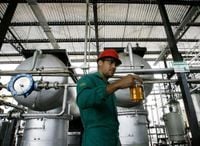On April 17, 2025, the Federal Government of Brazil enacted a decree aimed at enhancing the regulatory power of the National Agency of Petroleum, Natural Gas and Biofuels (ANP) to enforce compliance with the RenovaBio rules. This legislation specifically addresses the mandatory mixing of biodiesel into diesel fuel, a requirement that has been a point of contention in the Brazilian fuel market.
The decree was introduced in response to mounting criticisms from major fuel distributors, including Raízen, Vibra, and Ultrapar. These companies have raised concerns that smaller distributors are failing to mix biodiesel at the mandated proportion of 14%, which they argue creates an uneven playing field. By not adhering to the regulations, these smaller distributors can sell diesel at lower prices, undermining the competitive integrity of the market.
In a bid to address these issues, Sindicom—an organization representing large fuel distributors—previously requested the ANP to suspend the biodiesel mixing requirement for 90 days. However, this request was denied by the agency.
Alexandre Silveira, Brazil's Minister of Mines and Energy, emphasized the significance of the decree, stating, "This decree represents our commitment to combating the illegal fuel chain, which harms fair competition, the final consumer, and the national sustainability efforts. We are tightening the noose on those who insist on engaging in adulteration, tax evasion, and irregular fuel distribution. The biodiesel mandate will be fulfilled, and those who persist in illegal practices will be identified and punished."
Despite the strong rhetoric from the government, skepticism remains within the industry. An executive from the sector remarked, "Decrees never solved anything." This sentiment reflects a broader concern that while the decree is a step toward addressing serious issues in the biodiesel market, its effectiveness will ultimately depend on practical enforcement.
The ANP has historically cited limited capacity to oversee compliance due to inadequate regulatory instruments. However, with the new decree, the agency will gain the authority to arrest offenders, impose fines, and take necessary actions to ensure compliance. Yet, the task ahead is daunting; Brazil has over 40,000 gas stations, making comprehensive oversight a complex challenge.
Monitoring biodiesel compliance is notably more complicated than overseeing ethanol blending in gasoline. For ethanol, a simple pipette test can quickly determine the mixture ratio. In contrast, verifying biodiesel content requires laboratory analysis, which can take up to two weeks. While portable testing equipment exists, it comes with a hefty price tag of around R$ 500,000. Alarmingly, the ANP possesses only two of these devices to cover the entire country.
In light of these challenges, Sindicom has even suggested that large distributors might be willing to donate testing equipment to the ANP to facilitate compliance monitoring. However, the decree does not specifically address the procurement of such equipment.
Instead, it introduces new oversight mechanisms, including the publication of a public list of companies found to be non-compliant. This aims to increase transparency and accountability within the sector.
Additionally, the decree modifies the notification process for offenders, transitioning to electronic communications via messaging apps or email. This change is expected to streamline the process of informing companies of violations. Moreover, the decree significantly raises the penalties for non-compliance, with fines now ranging from R$ 100,000 to R$ 500 million, capped at 5% of the company’s annual revenue from the previous two fiscal years.
As part of its regulatory strategy, the ANP will also establish stock balances and monitor biodiesel acquisitions and withdrawals to ensure that they align with the volume of diesel B sold in the market. Companies with inconsistent stock balances will be publicly listed and barred from selling fuel until compliance is achieved.
The implications of this decree are far-reaching. While it aims to level the playing field among fuel distributors and uphold sustainability goals, the effectiveness of these measures will hinge on the ANP's ability to enforce compliance in a market characterized by its complexity and the sheer number of players involved.
As the situation develops, stakeholders in the Brazilian fuel market will be closely watching to see whether these new regulations translate into tangible improvements in compliance and fair competition. The government’s commitment to tackling illegal practices in the fuel sector is clear, but the path to effective enforcement remains fraught with challenges.
Ultimately, the success of the decree will depend on the collaboration between regulatory bodies and industry players, ensuring that the biodiesel mandate is not only a legal requirement but a practical reality.





